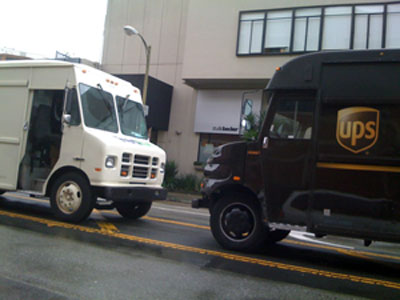
A FedEx truck and a UPS truck face off. | Flickr/<a href="http://www.flickr.com/photos/liquidator/4377164998/">liquidator</a> (<a href="http://www.creativecommons.org">Creative Commons</a>).
The Washington Post‘s Harold Meyerson has a great column today on the battle between UPS and FedEx, the parcel carriers, over whether FedEx should be governed by the same labor laws as its competitor. As it stands, FedEx, which started as an air transport company but has since expanded to ground service, falls under the Railway Labor Act (RLA), while UPS, which started as a ground service, falls under the National Labor Relations Act (NLRA). In practice, that makes it very hard for FedEx workers to unionize. Meyerson explains:
Drivers at UPS, FedEx’s main rival, and at other, smaller delivery companies can and have voted to form their own Teamster locals in myriad cities across the land, as the National Labor Relations Act (NLRA) permits. Under the RLA, however, the rules for forming unions are very different: The entire nationwide workforce must vote in a single election, and the union must obtain a majority not just of the workers voting but of voters and non-voters combined. (If a comparable rule held for presidential elections, requiring the winner to obtain a majority of the adult population of the United States, it’s not clear that this nation would have had a president since—well, ever.)
It seems obvious that two companies that directly compete in the same business should be governed by the same labor rules. That’s why the House passed a bill in March that would bring FedEx under the NLRA. But Sen. Lamar Alexander, a Republican who represents Tennessee, the home state of FedEx CEO and GOP donor Fred Smith, has pledged to kill the measure. And that gets us to what is perhaps the most interesting part of this story: the battle on Capitol Hill between FedEx lobbyists on one side and the Teamsters and UPS lobbyists on the other. This story gets at the heart of how Washington really works. Most legislative battles aren’t fought between disinterested parties looking for a common-sense solution—they’re fought between powerful interest groups with money at stake. FedEx vs. UPS + the Teamsters is just another variation of Wall Street vs. Big Hollywood.














